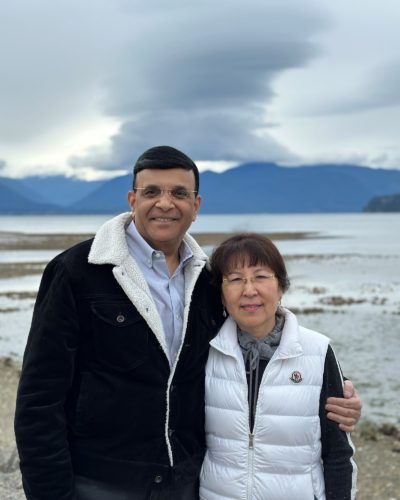In Cha Kim and Atul Dhablania endow a program allowing ophthalmology residents to gain invaluable surgical experience at an eye hospital in India.
by Eric Weintraub
In Cha Kim and Atul Dhablania were already strong supporters of the Keck School of Medicine of USC, having endowed the Dhablania and Kim Family Global Medicine Fellowship Fund in 2014, when they became involved with the USC Roski Eye Institute.
Atul’s brother-in-law was dealing with diabetes, a condition that had progressed to diabetic retinopathy, a common eye disease among South Asians that can cause vision loss and blindness. To help his brother-in-law, Atul and In Cha met with physicians at Roski to learn how they could be of help.
They soon learned of Roski’s Srikiran Institute Initiative, a new exchange program that could give USC ophthalmology residents the chance to do a clinical rotation at the Srikiran Institute of Ophthalmology in Kakinada, India.
“The opportunity connected the dots between our desire to support global medicine and what Roski wanted to do,” they said.
The day Kim and Dhablania heard of the initiative, they agreed to fund it. They pledged $50,000 for multiple years of support.
Beyond the initiative’s ties to the South Asian community, Kim and Dhablania had personal beliefs about why they thought the program would be effective.
“I always look at the efficiency of doing medical procedures overseas versus here in the States,” Dhablania said. “We have a lot of doctors in the family. Whenever they visit here, it’s astounding for them to see how a small procedure costs a lot of money and takes two to three times more effort or time than what is done overseas.”
Dhablania’s beliefs proved correct, resonating with the experiences of residents who traveled to the Srikiran Institute.
In March 2020, just before the global pandemic, senior resident Dr. Hadi Kaakour was among the first to experience the initiative envisioned by Kim and Dhablania. The experience offered him invaluable exposure to diagnose complex cases rarely found in America, such as retinitis punctata albescens dermatofibrosarcoma, myosin-heavy chain disease, and Klippel-Feil syndrome.
Notably, Dr. Kaakour operated on 25 patients over two weeks, and saw 15-20 patients in clinic daily. His first surgery took 40 minutes, but by the end of his rotation, he streamlined his work down to 15 minutes, mastering efficient techniques essential in India’s high-volume environment.
“I better understand how to treat people from a different culture,” Dr. Kaakour said, in a report to Kim and Dhablania. “Someday I’ll come across a case or face a problem in the OR and think of a trick I learned in India to address it. My experience changed me as a surgeon and caregiver, and it will for the rest of my working days.”
“His experience stood out completely,” Dhablania said, recalling Dr. Kaakour’s story. “It’s not only about him learning from colleagues in India. He himself was contributing. What he learned there is something he will carry on in his practices in America. I’m assuming when he sees South Asian patients he will probably approach them differently, since the complications they have may not be what he typically sees in America.”
The Srikiran Institute Initiative stalled briefly during the COVID-19 pandemic, but Kim and Dhablania’s pledge to keep supporting and expanding the endowment remains firm. Moving forward, they want all USC ophthalmology residents to have the chance to do a rotation in India. Likewise, they’d like Srikiran residents to rotate at Roski.
Kim and Dhablania continue to strongly support medicine at USC. They explained why philanthropy is so important to them:
“To those considering giving, our advice is to start early, even with a small amount, and stay consistent in your philanthropic goals. Everyone should allocate a portion of their earnings to help those in need, whether it’s for research, education, or global health. Once you start giving, it becomes a humbling and gratifying experience that motivates you to give even more and make a positive impact.”
